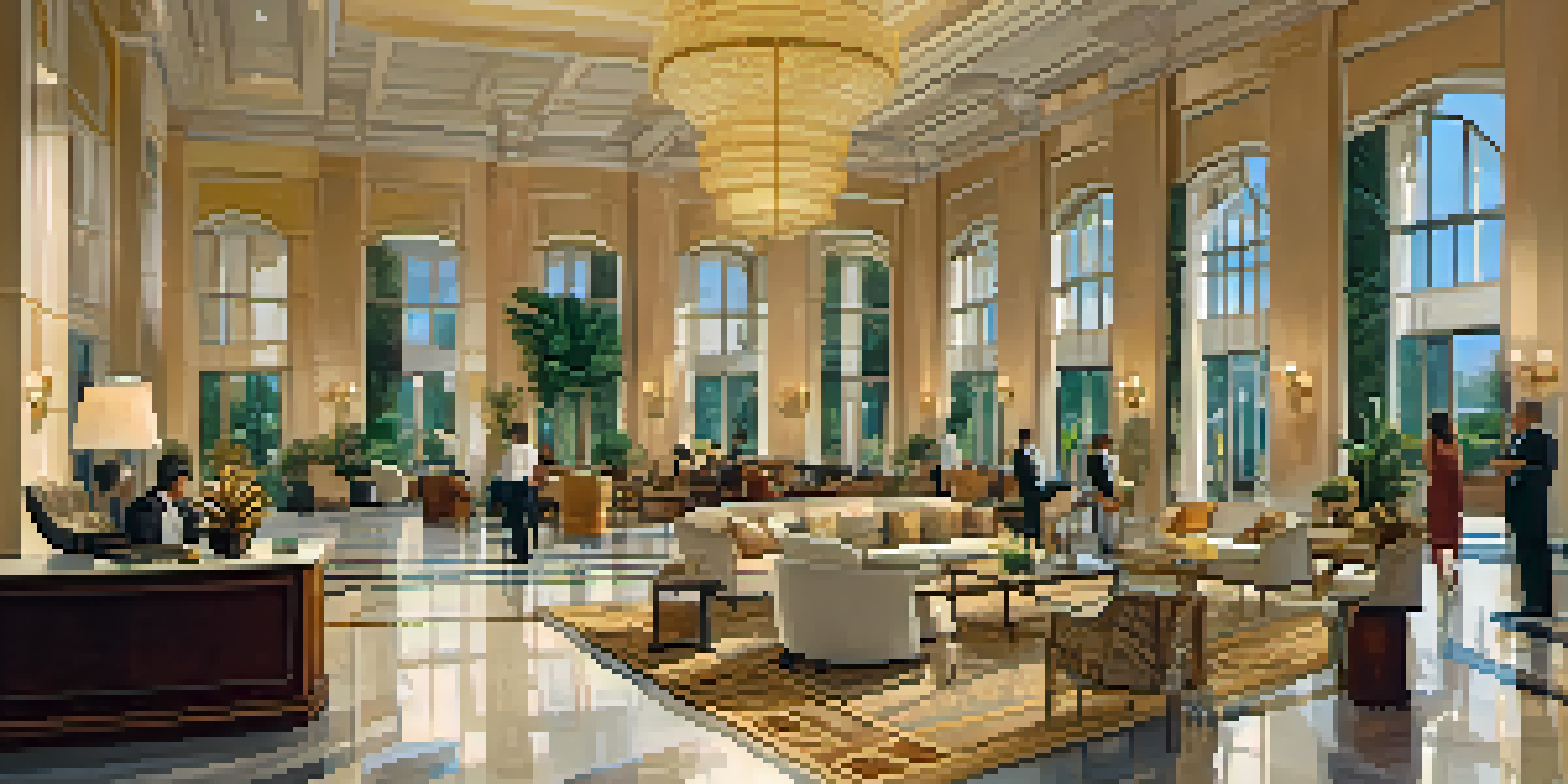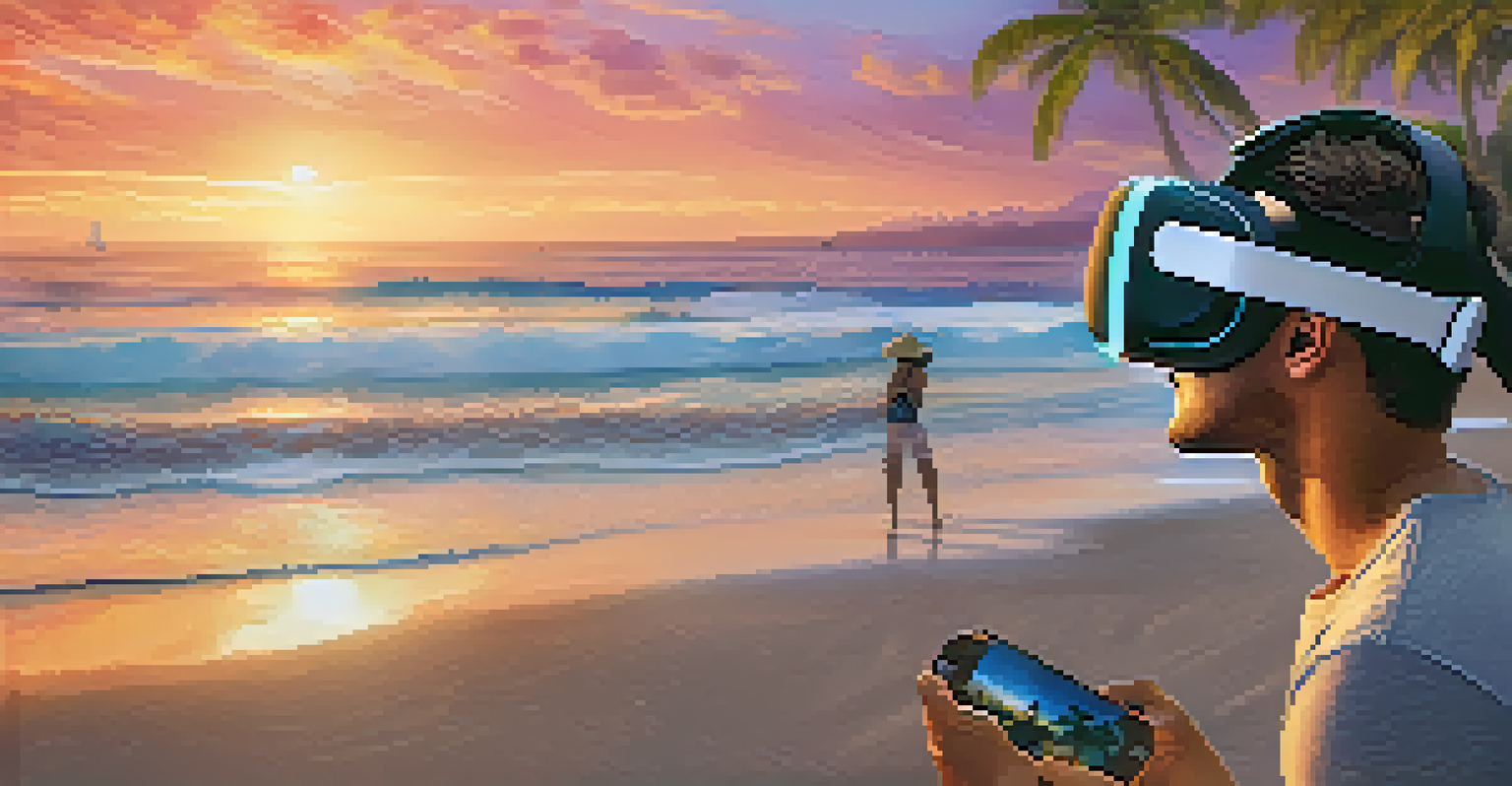Virtual Reality: Immersive Experiences for Luxury Travel

What is Virtual Reality in Luxury Travel?
Virtual reality (VR) is an immersive technology that creates simulated environments, allowing users to experience places and scenarios as if they were physically present. In the luxury travel sector, this means offering prospective travelers a taste of their next destination without ever leaving home. Imagine donning a VR headset and suddenly finding yourself on a sun-kissed beach in Bali or exploring the opulent halls of a Parisian palace.
Virtual reality is the ultimate empathy machine.
The appeal of VR for luxury travel is twofold: it provides a sneak peek into a travel experience and helps clients make informed decisions. Instead of sifting through endless brochures or websites, travelers can virtually walk through hotels, experience local attractions, and even sample gourmet meals. This not only enhances customer engagement but also enriches the booking process.
Moreover, VR can cater to diverse preferences and needs, offering tailored experiences that align with individual tastes. Whether it’s a romantic getaway, an adventurous excursion, or a lavish retreat, VR can showcase the best that luxury travel has to offer, making it a powerful marketing tool for high-end travel brands.
Benefits of VR for Travel Planning
One of the standout benefits of using VR in travel planning is the ability to visualize destinations accurately. Traditional marketing methods often rely on beautiful photography that may not fully represent reality. In contrast, VR offers a 360-degree view, allowing potential travelers to explore every detail, from the plush interiors of a five-star hotel to the breathtaking views of scenic landscapes.

Additionally, VR can enhance customer confidence in their travel choices. By experiencing a destination virtually, travelers can better assess whether it aligns with their expectations and desires. This leads to higher satisfaction rates and fewer cancellations, as clients feel more assured about their decisions.
VR Enhances Luxury Travel Planning
Virtual reality allows travelers to explore destinations and accommodations in immersive detail, helping them make informed booking decisions.
Another significant advantage is the opportunity for personalized experiences. With VR, travel agencies can curate customized journeys based on user preferences, showcasing specific activities or accommodations that might resonate more deeply with individual travelers. This level of personalization is essential in today’s luxury market, where clients seek unique and tailored experiences.
How Luxury Brands Are Adopting VR
Luxury travel brands are increasingly recognizing the potential of VR technology in enhancing their offerings. Leading hotels and resorts have begun incorporating VR presentations into their marketing strategies, allowing clients to explore rooms, amenities, and local attractions from the comfort of their homes. This not only sets these brands apart but also builds an emotional connection with potential guests.
The future belongs to those who believe in the beauty of their dreams.
Airlines are also jumping on the VR bandwagon, offering virtual experiences of their premium cabins and lounges. For instance, some airlines have created immersive videos that allow travelers to experience the comfort of their first-class seats, gourmet dining options, and exclusive services. This approach not only helps in selling tickets but also elevates the overall brand image.
Furthermore, travel agencies are utilizing VR to create interactive travel fairs and exhibitions. By bringing VR headsets to these events, they can engage potential clients in an unforgettable way, showcasing various destinations and experiences. This innovative approach helps in attracting a tech-savvy audience that values modern conveniences alongside luxury.
Challenges in Implementing VR in Travel
Despite its many advantages, implementing VR in the luxury travel sector isn't without challenges. One significant hurdle is the cost associated with creating high-quality virtual experiences. Producing realistic and immersive VR content requires substantial investment in technology, skilled professionals, and resources, which can be a barrier for smaller brands.
Another challenge is the accessibility of VR technology. While VR headsets are becoming more common, not every potential traveler has access to this equipment. Travel brands must find ways to make these experiences available to a broader audience, whether through partnerships with VR providers or by offering alternative viewing options, like 360-degree videos on websites.
Luxury Brands Embrace VR Technology
Leading luxury travel brands are integrating VR into their marketing strategies to create emotional connections and engage tech-savvy audiences.
Additionally, there’s the risk of over-reliance on virtual experiences. While VR can effectively showcase destinations, it should complement — not replace — the real travel experience. Brands must ensure that their virtual offerings align with the actual experiences travelers will have, maintaining authenticity and setting realistic expectations.
The Future of VR in Luxury Travel
Looking ahead, the future of VR in luxury travel is promising and ripe with opportunities. As technology continues to evolve, we can expect even more immersive experiences that blur the lines between virtual and reality. Innovations like haptic feedback and scent integration could further enhance the sensory experience, making virtual travels even more lifelike.
Moreover, as consumer behavior shifts towards prioritizing experiences over material possessions, VR can play a crucial role in shaping travel decisions. Luxury brands can create compelling narratives around their offerings through VR, allowing clients to envision their journey and inspire them to book that dream vacation.
Lastly, the integration of AI and machine learning with VR technology could lead to hyper-personalized experiences. By analyzing user preferences and behaviors, brands can create tailored virtual journeys that resonate with each traveler, ensuring that luxury travel remains not just a service but a memorable experience.
Real-World Examples of VR in Luxury Travel
Several luxury brands have already embraced VR technology, showcasing its potential in the travel industry. For instance, Marriott International launched a VR program called 'VRoom Service,' allowing guests to order VR experiences directly to their hotel rooms. This innovative service lets travelers explore various destinations and activities, enhancing their stay.
Another example is Thomas Cook, which introduced a VR app that enables users to virtually experience holiday destinations before booking. By allowing customers to explore hotels and local attractions, Thomas Cook has successfully integrated VR into its sales strategy, appealing to tech-savvy travelers looking for immersive options.
Challenges of VR Implementation
Despite its advantages, high costs and accessibility issues pose challenges for luxury travel brands looking to implement VR experiences.
Additionally, luxury cruise lines like Royal Caribbean are leveraging VR to showcase their ships and itineraries. By providing potential guests with virtual tours of their vessels, they can highlight the luxurious amenities and unique experiences available onboard, enticing travelers to book their next cruise adventure.
Conclusion: Embracing VR for Luxury Travel Success
In conclusion, virtual reality represents a transformative force in the luxury travel industry, enhancing how travelers plan and experience their journeys. By providing immersive previews of destinations and accommodations, VR empowers clients to make informed decisions and fosters a deeper connection with luxury brands. As technology advances, the integration of VR will only deepen, creating even more engaging experiences for travelers.
However, it’s essential for brands to approach VR thoughtfully, ensuring that virtual experiences align with the realities of travel. By maintaining authenticity and managing expectations, luxury travel brands can harness the power of VR without losing sight of the genuine experiences that travelers crave.

Ultimately, embracing VR technology may well be the key to standing out in a competitive luxury market. As consumers continue to seek unique and personalized experiences, those who innovate and adapt will undoubtedly lead the way in redefining luxury travel for the modern age.